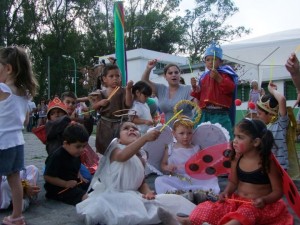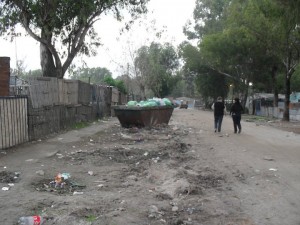Building a learning community amid harsh conditions
After Barrio Mosconi, the circus workshop moved to El Dique, another slum in the district of Ensenada. Having set foot in both, I could tell the difference between them was that the latter has worse living conditions: informal housing and dirt roads instead of paved streets. Also, as Liliana put it very well during the meeting we had: El Dique has a bigger population, so it is able to have a Centro de Integración Comunitario. The proper translation would be “Community Integration Center,” and it is a special building provided by the government, where there is space for health initiatives as well as social development, arts, education and sports programs. This is where the circus classes took place.
I think it’s worth talking about these places and describe what they do. I often believe that I was able to get so far in a career and be so passionate about learning because, ever since I can recall, I was stimulated and challenged. Nothing was ever missing in my house, and that, I believe, is the starting point. When I first talked to the people working at the Centro Integrador, I understood their role in the kids’ life was giving them emotional support, challenging them and encouraging them to take up a profession.
Kids and teenagers who come from impoverished homes often lack not only dedication to school – they are also not encouraged to study and improve themselves. More often than not, their parents are uneducated and unemployed: a context that is born and reborn with every economic crisis. Why would they study, if they’ll never get out of this situation? I can understand this reasoning. It’s hard to make someone that is so cut down by this harsh reality, understand that things can change.
This is why I value so much what they do at the integration center. I had a chance one day, when I was visiting with the circus team, to talk to Valeria, one of the coordinators of a program called El Envión (the title means “the shove, ” as when you give someone a little push so they can move forward). This program organizes different activities at the integration center. Valeria told me they try whatever seems catchier: Photography was very popular; the circus was a real hit; and painting was getting on super.
“We also give school support for subjects like foreign languages or math – or anything the kids need. You can tell they have a nice time here. Sometimes they say things like ‘I wanna miss school so I can come here all the time.’ But we tell them school is a must, and absence is not an option,” she said. “Here we give support and make a lot of activities to get them interested. The main aim is that they don’t drop out of school. When they finish secondary school, we sit together with them and a college guide and ask ‘What career will you pick?’”
I could hear the urgency and constant effort in her words.
I can tell that kids learn when they are motivated. When they find support, they can take a step forward. How do you make this happen when they stand alone, when there is no home, no conventional family? How does it work where you live?





